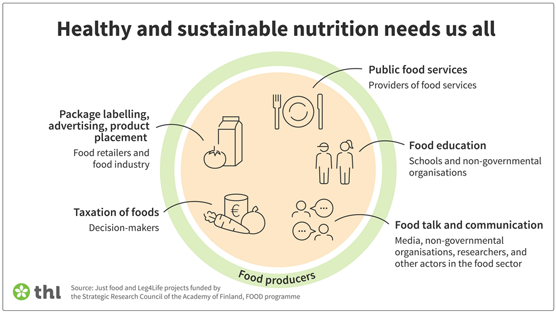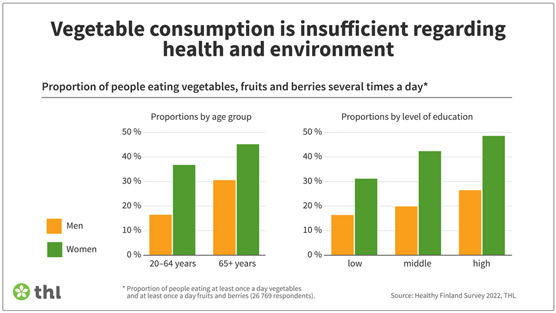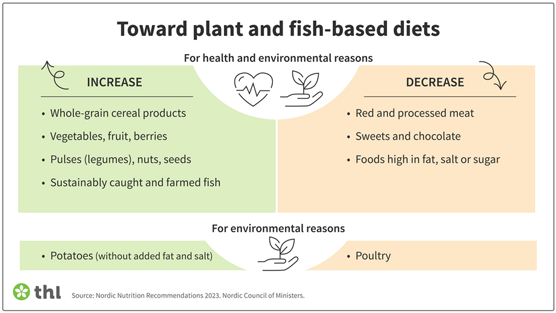
© THL
Finns are advised to eat more vegetables, whole grains and sustainably caught and farmed fish. At the same time, they should reduce their consumption of red meat, processed meat and foods rich in salt, fat or sugar. A change in diets would not only promote people’s individual health but also planetary health.
These guidelines are based on the new Nordic Nutrition Recommendations published in June 2023, which the National Nutrition Council uses as basis in updating the national nutrition recommendations.
“All of us should consume more plant-based products, such as vegetables, whole grains, nuts and seeds. Even moderate changes have significant health and environmental benefits if the majority of people implement them”, says Senior Researcher Niina Kaartinen from THL.
Two projects of the Strategic Research Council – Just food, which promotes a just food transition, and Leg4Life, which focuses on legumes as a tool for a sustainable food system and health – have prepared a policy recommendation on how society can support the transition toward more plant and fish-based diets.
The policy recommendation is aimed specifically for decision-makers, public health advocates and the food sector.
Dietary changes can be supported with a wide range of instruments
There are many kinds of instruments available for different actors: a) strengthening food education, b) developing food services, c) creating a healthy and sustainable food environment by food retailers and food industry, d) taxation of foods, and e) positive and diverse food talk and communication.
“Healthy and sustainable nutrition concerns us all. All of society is needed in building a healthy and sustainable food environment”, says Research Professor Minna Kaljonen from the Finnish Environment Institute.
Few Finns eat enough vegetables, fruit and berries
The recommendation is to eat vegetables, fruit and berries several times a day. Based on the Healthy Finland survey conducted by THL in 2022, only a small proportion of Finns meet this goal, with clear variation between population groups. For example, only 17% of men under 65 eat vegetables, fruit and berries several times a day, with 37% of women doing so.

© THL
Updated national nutrition recommendations should form the basis for a sustainable food and nutrition policy
The Nordic Nutrition Recommendations take the latest scientific evidence on the associations between nutrition and health and combine it with information on the environmental impacts of food consumption. More than 400 specialists participated in drawing up the recommendations. The National Nutrition Council is currently using these recommendations to update the national nutrition recommendations for Finland.
The Nordic Nutrition Recommendations focus on reducing the consumption of animal products and increasing the consumption of plant-based food. The recommendations encourage reasonable consumption of meat and dairy products. Legumes, whole grains and sustainably caught and farmed fish are good alternatives to meat.
“In essence, it is about increasing diversity in diets. There are many ways to have a healthy and sustainable diet”, says Associate Professor Anne-Maria Pajari from the University of Helsinki.
The Just food and Leg4Life projects encourage the use of nutrition recommendations as the basis for sustainable food and nutrition policy.

© THL
Research data on the transition to a more sustainable food system
Since 2019, two projects funded by the Strategic Research Council – Just food, which promotes a just food transition, and Leg4Life, which focuses on legumes as a tool for a sustainable food system and health – have researched the possibilities and ways of moving towards a healthier and more sustainable food system.
Partners in these projects include the Finnish Institute for Health and Welfare (THL), the University of Helsinki, the Finnish Environment Institute (Syke), the Natural Resources Institute Finland (Luke), the University of Jyväskylä, E2 Research, and the University of Bern.
Read more
-
Kaartinen N, Paalanen L, Bäck S, Kortetmäki T, Lamminen M, Maukonen M, Männistö S, Sares-Jäske L, Selänniemi M, Kaljonen M, Pajari A-M. Diets are part of solving health and environmental challenges – new nutrition recommendations support sustainability transition. Policy brief 1/2024, THL.
Further information
- Niina Kaartinen, Senior Researcher, THL, tel. +358 29 524 7384, firstname.lastname@thl.fi
- Laura Paalanen, Senior Researcher, THL, tel. +358 29 524 8816, firstname.lastname@thl.fi
- Minna Kaljonen, Research Professor, Finnish Environment Institute, tel. +358 29 525 1252, firstname.lastname@syke.fi
- Anne-Maria Pajari, Associate Professor, University of Helsinki, tel. +358 29 4158 203, firstname.lastname@helsinki.fi